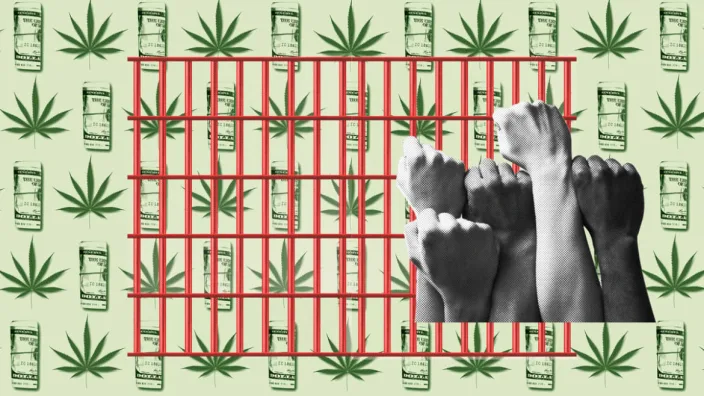Yahoo News
“Tis the season to get funding for your Cannabis Business with FundCanna!”
That’s a message that landed in my inbox yesterday. Fun! How can I start and grow a legal weed business? Maybe I should move out of Brooklyn, since every other storefront is now an unlicensed weed business, so there’s not much market share left—even for the few legal recreational dispensaries that received state licenses but have yet to open.
So where would I go?
“We provide Green for Green!” FundCanna promises. “FundCanna is here to help your company grow. By utilizing our financial products, you will be able to pay your bills faster, purchase more inventory, and scale your business.”
There is a lot of “green” in the legal pot industry. An assessment published last March by New Frontier Data found that new markets slated to legalize could inflate cannabis sales to $72 billion by 2030. According to Marijuana Business Daily, the average marijuana dispensary makes $974 in revenue per square foot of space, which is apparently a “higher” profit margin than Whole Foods. Great.
The growth of the legal marijuana industry has coincided with a heightened awareness of the War on Drugs and mass incarceration. Communities of color have, for generations, been ravaged by the bipartisan consensus to police people for a plant. And now we, as a society, apparently care about rectifying past sins. Also great.
On December 1, while visiting Princeton University, I posed for a photo with Michael Thompson and Kate Brown, the Governor of Oregon. Thompson was paroled in 2021 after serving 25 years (out of sentence that could have kept him locked up for up to 60 years) for selling pot to a police informant.
As Michael Thompson is feted by fancy rich people, two of his daughters are homeless.
My post on the intergenerational curse of mass incarceration. https://t.co/7nT0lF4EeG pic.twitter.com/9oyVveVsCy
He has achieved a kind of celebrity in social justice circles through his work with the Last Prisoner Project, a large nonprofit devoted to freedom for drug prisoners. He tells his story with raw emotion that resonates among lawmakers, advocates, and business people who trade in marijuana.
He was at Princeton to speak at a panel with Gov. Brown and New Jersey Attorney General Matt Platkin. Both Brown and Platkin embrace criminal justice reform, with Brown recently for people convicted of nonviolent cannabis-related offenses. As a result, more than 45,000 people’s records were cleared of those crimes—freeing them from the burden of paying outstanding fines.
Every person who benefits from the new legal weed industry—whether as a “pot-repeneur” or a state lawmaker balancing their budget thanks to legal weed—should be required to share in the largesse with Drug War victims and their families. In a 2020 paper in a special issue of on ethicists Jessica Flanigan and Christopher Freiman lay out an argument for reparations to victims of the War on Drugs.
“Look at how much money this city has taken away from Black and brown families for, like he said, small amounts of marijuana,” Greg , another member of the group, added. “It’s an injustice we must stand [against] right now.”
In 2019, Illinois lawmakers passed cannabis legislation that was the most equitable so far, even including reparations. But it was never implemented—except in Evanston, where lower than projected marijuana tax revenue has delayed and hobbled the dispensation of And according to Rep. Sheila Jackson Lee—who represents Evanston and advocates for federal reparations, Evanston is far ahead of other cities.
“Sadly, there has been no progress in advancing economic equity in the cannabis industry, and reparations for the War on Drugs have been abandoned altogether,” writes the activist group Action Network in a petition to The petition demands “regular, direct cash payments for Survivors of the War on Drugs… education, housing, and healthcare as compensation.”
A special task force in California launched by the state released a report on racist drug enforcement arguing for reparations for Black Americans. But they’re not even slated to release the final report until July 2023. Compared to the rapid spread of legal and gray market marijuana dispensaries, the fact that nothing close to compensation for victims of the drug war has materialized strongly indicates a lack of political will, outside of activist circles.
Father and daughter bonded. He bought her a car. But in May 2021, Winslow was found dead in a parked car in Shreveport. He’d been shot, the victim of an The car has since broken down. Canada doesn’t have the $3,000 for a loan to get a new one.
I also previously 42-year-old Crystal Munoz who gave birth, shackled, while serving a 20 year federal sentence for conspiracy to distribute marijuana. Munoz’s role in the “conspiracy” was to give a hand-drawn map to former friends who planned to smuggle drugs. They took plea deals and testified against her at trial.
H/T: news.yahoo.com



